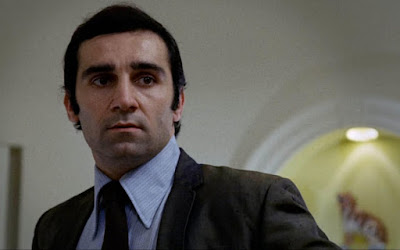Tony Lo Bianco, who has died aged 87, was an American actor whose Italianate looks served him well in the post-Godfather cinema landscape. Yet he spent much of his 60-year stage and screen career striving to evade mob-movie stereotyping after playing Sal Boca, the low-level criminal placed under rigorous surveillance in the Oscar-winning The French Connection (1971).
Violence figured prominently in Lo Bianco’s filmography. He exploded on screen as Ray Fernandez, the conman who seduces a murderously possessive older woman (Shirley Stoler) in the pulpy true-crime indie The Honeymoon Killers (1970). Even here, though, he was more versatile than many assumed: “They wanted to cast a guy with a Spanish accent. I’m Italian-American, but I took on a Spanish accent and landed the role. Everybody thought it was genuine, then they heard my real voice one day on set, they couldn’t believe it.”
But he could project vulnerability, too. Memorable as the detective cracking up while investigating random murders in cult thriller God Told Me To (a.k.a. Demon, 1976), he also earned a Tony nomination as Eddie Carbone in the 1983 Broadway revival of A View from the Bridge.
Interviewed in 1973, Lo Bianco cited his theatrical grounding as the secret of his initial success: “I’m not worried about becoming stereotyped. I’m the kind of actor who has trained well, and I know what I’m doing and where I’m going. Crime is popular now, it will establish me, so that one day, hopefully, I can say ‘Okay, now I want to play Little Orphan Annie.’”
Anthony Lo Bianco was born in Brooklyn on October 19, 1936, second of three sons to cab driver Carmelo Lo Bianco and wife Sally (née Blando). An athlete from a young age – he boxed to Golden Gloves level – he discovered acting at William E. Grady High School: “Two students were performing a scene from Julius Caesar between Brutus and Cassius. I had no idea what they were saying, I couldn’t understand a word. But I was fascinated by the sound… the pitter-patter of the speech.”
Upon graduating, he enrolled at Erwin Piscator’s New School-affiliated Dramatic Workshop, where his tutors included Stella Adler. He briefly taught drama himself, before co-founding the Triangle Theater, an influential company that specialised in cerebral leading men. (Alumni included Lo Bianco’s French Connection co-star Roy Scheider.)
Lo Bianco debuted on Broadway in 1964 in Arthur Miller’s Incident at Vichy; he took an inauspicious movie bow as an ineffectual boyfriend in Doris Wishman’s The Sex Perils of Paulette (1965). Yet authority soon settled on these squarest of shoulders.
In 1984, Lo Bianco won a New York Emmy for playing former mayor Fiorello La Guardia in the TV filming of Paul Shyre’s play Hizzoner! The play became a passion project: after buying the rights, Lo Bianco rewrote the text as “a vehicle to express my concerns for the public and political mess that we’re in”. He performed the original and his self-penned variations – La Guardia (2008) and The Little Flower (2012-15) – in Moscow, Rome and across the US.
Funding came from playing brutes of various stripes in films of varying quality. In Oliver Stone’s Nixon (1995), Lo Bianco was mafioso Johnny Roselli, dispatched by the CIA to poison Fidel Castro; he helped spoof Scorsese in Jane Austen’s Mafia! (1998); in the Cleveland-set Kill the Irishman (2011), he jostled for space with Christopher Walken and Vinnie Jones.
His final role was as the patriarch in Ray Romano’s directorial debut Somewhere in Queens (2022), a fond portrait of Italian-American life. In 2023, Lo Bianco summarised his career in the newsletter of the Sons of Italy in America, the fraternal order for whom he was once a spokesperson: “I’ve worn a lot of faces, and to me, acting was always about human connection – it’s the only thing that matters.”
He is survived by his third wife Alyse Lo Bianco, two stepchildren, and two of his three children from his first marriage; his daughter Anna died of breast cancer in 2006.
Tony Lo Bianco, born October 19, 1936, died June 11, 2024.












